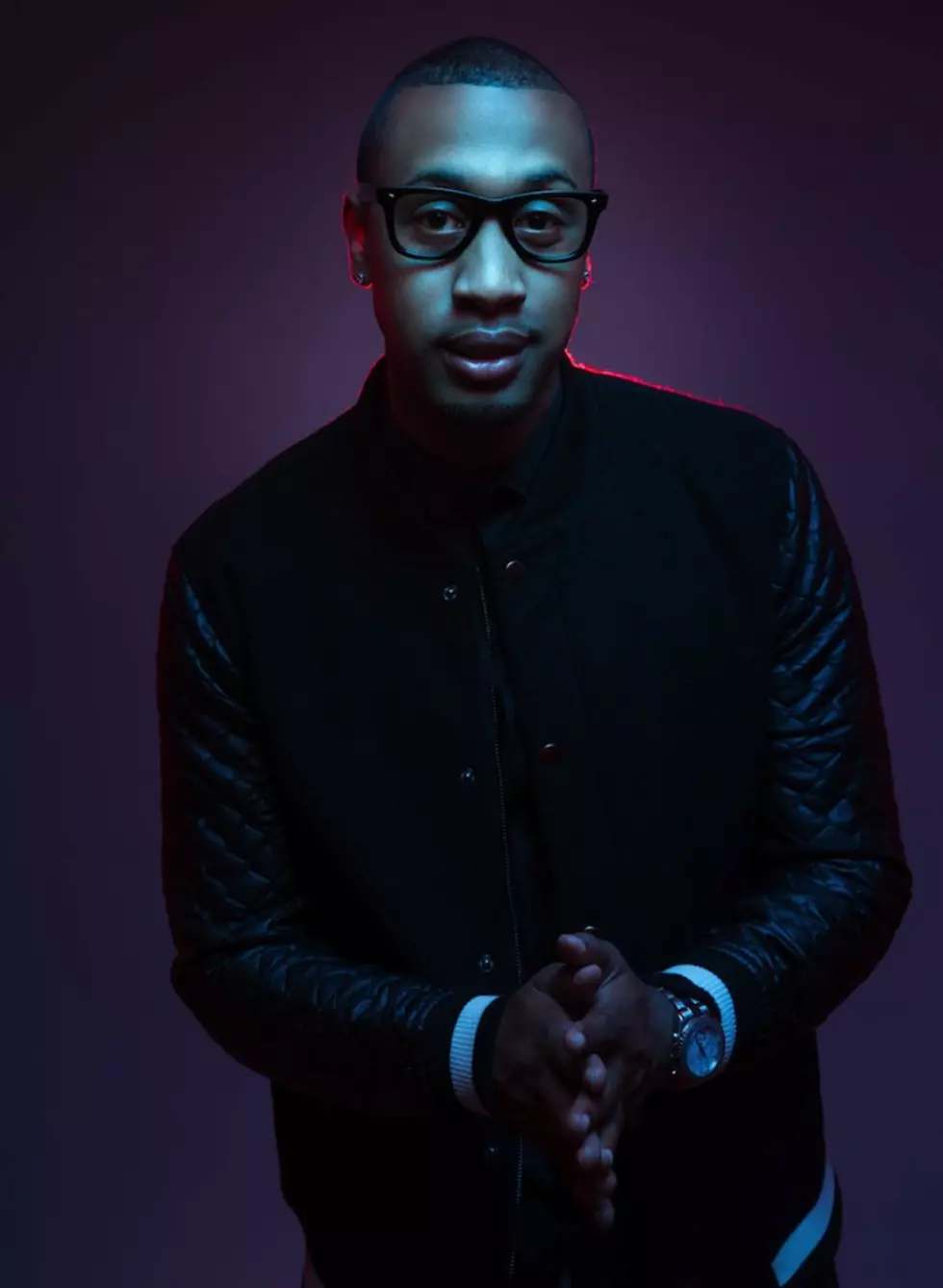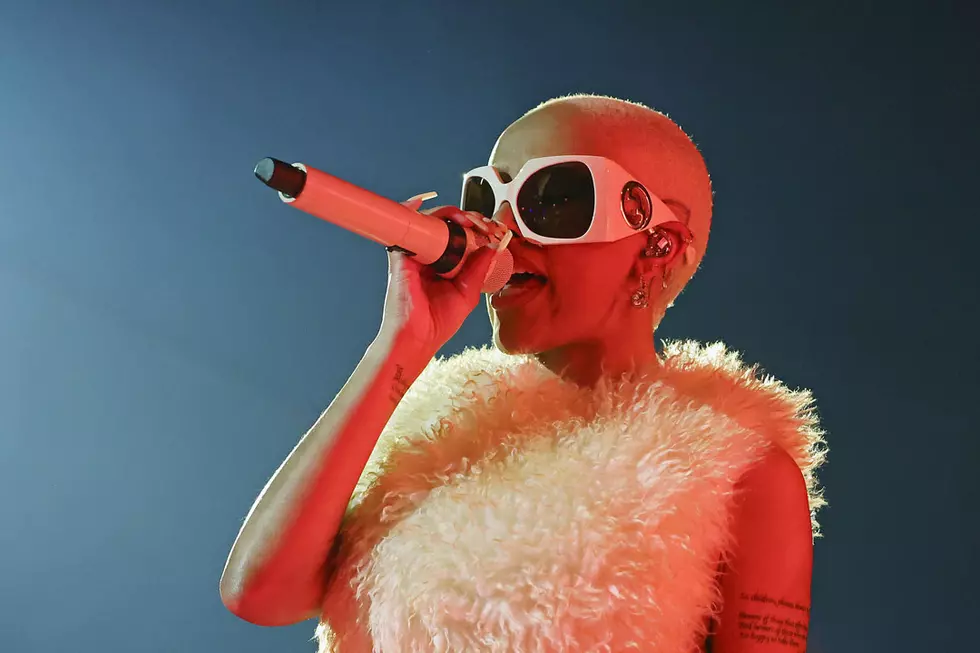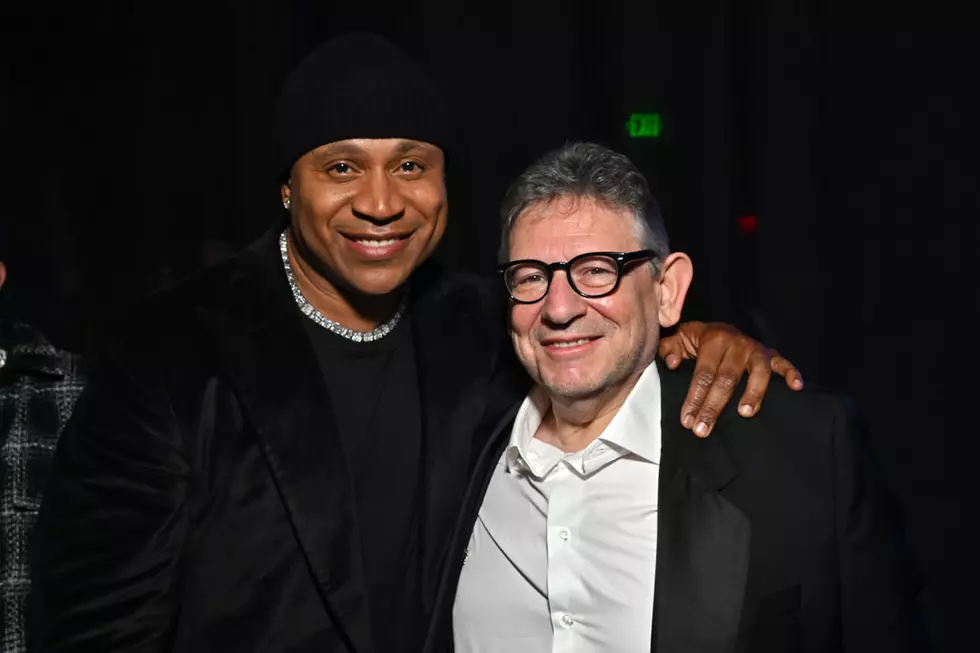
Lil Wayne’s Manager Cortez Bryant Is One Of Hip-Hop’s Most Important Figures
I'm A Boss
As Lil Wayne's manager, Chief Operations Officer of Young Money Entertainment and co-CEO of The Blueprint Group, Cortez Bryant is one of the most important figures in hip-hop.
Words Jeff Weiss
Images Jeremy Danger
Editor’s Note: This story originally appeared in the October/November 2014 issue of XXL Magazine.
The line of cars to enter the Drake VS Lil Wayne concert stretches for miles. It’s Labor Day weekend in Atlanta and the entire city is seemingly here—from dread-locked Zone 6 trappers to Georgia Tech sorority girls. Horns are honked, bootleg t-shirts hawked, and Wayne featuring Drake’s “Believe Me” blasts from promo tents assembled by local radio stations. The mood is part religious pilgrimage, part “Players Holiday.”
The commotion only increases backstage. Triceratops-sized bodyguards protect entrances to black tour buses, each a block long. Staffers scurry in and out of the temporary nerve center established at Aaron’s Amphiteatre at Lakewood. All 19,000 tickets are sold out. The show starts in 45 minutes. Guest list passes are being frantically dispatched to everyone’s cousins, best friends, and favorite Southern rap stars.
Amidst the chaos, Cortez Bryant stays calm as a quarterback in the zone. After all, the longtime manager for Lil Wayne and partial mastermind of Drake and Nicki Minaj’s rise has been doing this for a decade. In that time, the co-CEO of The Blueprint Group helped transform the artists on Wayne’s Young Money Entertainment from ascendant stars to global icons and brand ambassadors.
As the Chief Operations Officer of Young Money—the label that Wayne founded in 2005 under the imprimatur of Cash Money Records and Universal Republic—Bryant has spearheaded the strategic roll out of each YMCMB artist. He’s earned their trust through a combination of commercial instincts and devotion to carving out a unique path true to each musician’s persona. But there’s an alternate reality in which it doesn’t happen. “This was never really an option in my head,” Cortez says, acknowledging the hive buzzing around him. Wearing a black five star general t-shirt, black shorts, and lensless black glasses, the 35-year old New Orleans native sits inconspicuously in a backstage garden area.
Before managing the most influential rappers of the modern era, Cortez Bryant was a mass communications major at Jackson State in Mississippi. A childhood interest in filming family functions with a camcorder led him to pursue internships at local news stations, public access TV, and the university’s production studio. He got so good at editing and camera work that CNN offered him a job upon graduation. But it’s more difficult to say no to Lil Wayne.
The two had been tight since Wayne enrolled at Eleanor McMain Secondary School, one of New Orleans’ best public schools. Bryant ran with the cool crowd—a varsity basketball and track letterman, and captain of the school’s marching band. The future Weezy F. Baby was a seventh grader, three years younger, but immediately making a splash on campus. “Wayne came in dressed to the tee: Gucci shoes on, his mom had him clean,” Bryant remembers. “He always had a crazy bandanna hanging out his pocket, pick in his hair. I was like look at this lil’ nigga coming in thinking he gonna take over our school. Like, ‘What you doing, man?’ Always had a chick. So we looked at him like that’s a cool little dude, he was swagged out at a young age.”
The son of a single teenaged mom, Bryant spent his early years in the rougher wards of the Crescent City. After his mother obtained medical assistance degrees, the former hairdresser moved her only child to the middle-class East Side of the N.O, where he enrolled at the prestigious Eleanor McMain Secondary School.
Bryant’s classmates included Mack Maine and Curren$y, but Wayne quickly became known as the best and practically only rapper at the college prep school. Before becoming the youngest member of Cash Money’s rap group, The Hot Boys, Wayne spent most afternoons chilling at Bryant’s house. Offered a band scholarship to Jackson State, Bryant eventually became leader of the drumline. “When all those songs played in my ear, I started understanding melodies and hooks and what sells,” Cortez explains, as a roar of applause erupts for the show’s opener, PARTYNEXTDOOR. “I’m a historian when it comes to looking at other people’s songs and the hits that work and why they’re working.”
While studying communications at Jackson State, Bryant left for several semesters to work as a roadie on Cash Money tours with Nelly and the Ruff Ryders, but always returned to school. Shortly before Bryant’s graduation in 2004, Wayne asked his long-time ally to be his full-time manager. “[Wayne] never had a manager,” Cortez says. “[He] was always Cash Money run. He was like, ‘I’m trying to move my career on and I want someone I can trust around me. Are you willing to be that?’”
After careful deliberation and soul searching, Bryant agreed to help his friend. And almost immediately, the things that they don’t teach you in college were tested. Their first rodeo together found them in Dallas, where Bryant had booked Wayne a show with a local promoter. But when the club didn’t fill up, the janky thief vanished and left Bryant to explain to Wayne why they weren’t getting the back half they’d been promised. “I was damn near about to break down in tears,” Cortez tells. “I was having a nervous breakdown on the floor in my room in the fetal position and he’s laughing. He’s like, 'You got the front half so we got a free trip to Dallas. You’ll learn from this.'”
If the industry is replete with two-bit hustlers and friendships of convenience, Bryant and Wayne are one of the rare stories to the contrary. There have been fights, but the pair have never wavered in their loyalty or mutual respect.
Along the way, Bryant has become one of the most quietly important A&Rs of this generation, helping Wayne select production, singles, and final track listings. When executives from Universal Republic threatened to refuse to issue clearances for Wayne’s cameos during his 2006-2008 run, Bryant convinced them to believe in Wayne’s vision. “Wayne looks at him as a big brother and protection,” says Katina Bynum, senior vice president of marketing for Cash Money. “He and Wayne are friends and I know that out of everyone who has managed Wayne, he trusts [Cortez] the most.”
If Wayne were his only client, Bryant’s impact would remain impressive. After all, when he assumed management, the rapper was best known for his first and then highest-charting single, 1999’s “Tha Block Is Hot.” He’s subsequently won four Grammys (with 16 nominations), sold a million copies in one week, and surpassed Elvis Presley as the solo act with the most Billboard Hot 100 appearances.
But since initially partnering with Gee Roberson and his former partner Kyambo “Hip-Hop” Joshua of Hip-Hop Since 1978 in 2006, Bryant has helped build one of the most powerful management firms in hip-hop. “We only had one client, Kanye West, and we really weren’t working to add anyone,” tells Roberson. “It just happened to be that Hip-Hop and I were fans of Lil Wayne and we decided to reach out. Just having conversations with him and ’Tez, to be honest from day one, it just clicked.”
After a half a decade of working together and slowly expanding the rosters of Bryant Management and Hip-Hop Since 1978, the firms officially consolidated their forces as The Blueprint Group.
“He’s a sponge and learned album roll outs, touring, publishing, teaching partnerships, branding, networking and all the layers that come with growth and experience,” says Roberson. “He’s had that crash course. There’s no better life example than living through certain experiences.”
Dealing with such a high-powered roster comes with its own share of turbulence. Clients and co-managerial roles have come and gone. In 2013, Drake absolved Bryant and Hip-Hop Since 1978 of management duties in favor of his original Canadian team.
At the moment, The Blueprint Group’s current roster includes Wayne, Nicki Minaj, T.I., and Bryant’s most recent focus, G-Eazy. As overall album sales continue to decline, the agency has deftly transformed its artists into global brand ambassadors.
In the last two years alone, Wayne and Minaj have signed branded ventures with Beats By Dre and endorsement deals with Pepsi and Mountain Dew. Minaj has her own fragrance and Kmart clothing collection. Lil Wayne’s skater-themed Trukfit line is in department stores nationwide. “I pay attention to what everybody’s doing,” Cortez explains. “What else can we do that makes sense? It starts with knowing our artists and what makes sense for them. Nicki [loves] fashion, let’s see what we can do. One of the first deals we did for Nicki was the MAC deal and OPI nail polish. We take those partnerships, leverage their money and our ideas and think forward. What can we do to push the envelope a little bit and do some other dope shit?”
Bryant mostly prefers to deflect the credit to his artists and the entire Blueprint team. While modesty is the default setting for most interviews, Bryant’s humility isn’t a put-on. This was the first extended conversation he’d ever granted to a magazine. He has the antithesis of the superstar CEO mentality, opting instead to savor his victories in the shadows.
“My reward isn’t going on stage and accepting awards. You don’t have to call me out and give me an acknowledgment,” Bryant says, admitting that the job has come with its share of sacrifices. Currently a Los Angeles resident, he’s unmarried and laughs about how every conversation with his mom ends with her asking him when he’ll give her grandkids.
Now, the next frontier is sports management. Cortez and Wayne are launching an agency to represent the world’s top athletes. So when he’s not navigating the pressures and logistics of a national tour with two of rap’s biggest superstars, Bryant is studying the demands and quirks of a wholly new industry.
“[If] I believe in you, I see something in you, let me help you try to fulfill your dreams,” Bryant adds as the roar of 19,000 ticket-holders telegraphs that Drake and Wayne are about to take the stage. “And that’s always been my reward.”
The concert itself is a microcosm of why Bryant has been successful. The production value is arena-rock worthy, with multi-piece bands, Street Fighter II themes, and a phone app that lets the audience vote on the winner of that night’s show (Drake or Wayne). Both the concept and execution take rap far beyond the scope of where it was five years ago.
Of course, there are the hits. Non-stop for about two hours. As soon as the curtain lifts, Bryant is on the move, ensuring that things run smoothly, the VIPs are accommodated, the sound is right, and everything is seamless. He is a consummate professional but without the uptight fury expected from most big-time managers—never once does he lose his cool.
When the show ends, a crowd rushes the backstage area, forming another lengthy wait to enter the backstage area. Bryant takes one look and immediately spies a second entrance that no one has noticed. “Everyone’s trying to go over there,” he says, pointing at the mob, then nodding his head at the open lane that no one has yet figured out how to taken advantage of. “So let’s go over there, where no one’s at.”
Related: Young Money CEO Cortez Bryant Speaks on Drake’s Distribution Deal
Cortez Bryant Clarifies Kobe’s Carter V Tweet
Lil Wayne’s Tha Carter V Album Cover Will Be Revealed Later Today On SportsCenter
Editor-In-Chief Speaks On XXL’s New G-Unit Cover
G-Unit Is On The Cover Of XXL’s New Issue
More From XXL









